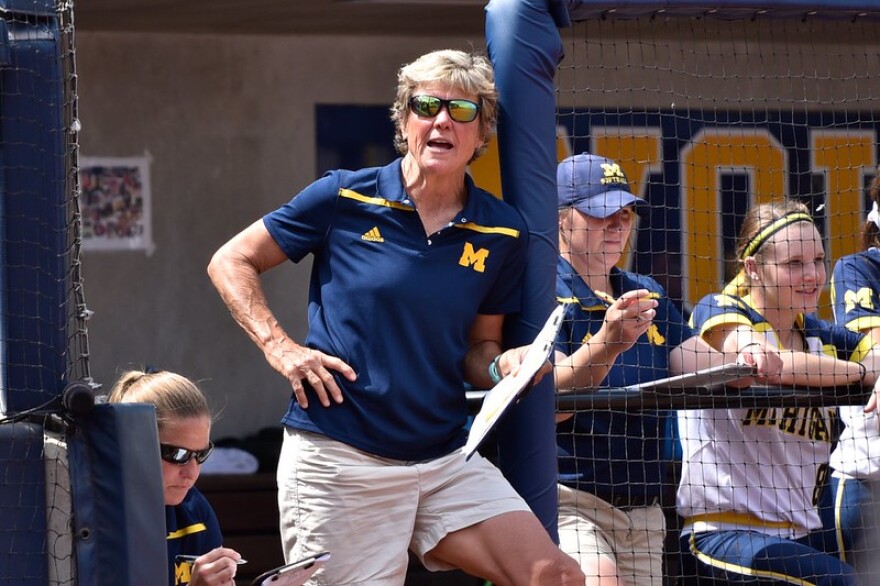After 1,707 wins, University of Michigan softball coach Carol Hutchins is calling it a career.
Hutchins announced her retirement Wednesday. During her 38 seasons as the Wolverines’ head coach, Hutchins led Michigan to 22 Big Ten Conference championships and the 2005 NCAA title. U of M has selected Hutchins' longtime assistant Bonnie Tholl as the next head coach.
For a look at Hutchins’ career and legacy as a pioneer in women's athletics, Michigan Radio Morning Edition host Doug Tribou spoke with sports commentator John U. Bacon.
Doug Tribou: Carol Hutchins leaves the sport with more wins than any other softball coach. What stands out the most to you about her accomplishments on the field?
John U. Bacon: One is that people don't realize in their 60 or 70-game schedule they can't play a home game in Michigan until mid-season because it's snowing up here. They have to play in Arizona or Texas or Florida, for basically two months on the road, while [players are] in school. And her students are still knockout students.
And then you win the national title in 2005. Doug, let me tell you this right now. When Alabama has a men's hockey team that wins the national title, they will have done what Carol Hutchins has done in women's softball.
"She is incredibly demanding. She's got extremely high expectations. But she loves her players. She cares about them deeply. They've done phenomenally well after softball. So her leadership cannot be underestimated."John U. Bacon on Carol Hutchins' coaching style
DT: Hutchins’ teams made 12 appearances in the Women’s College World Series. They only won once, but that win in 2005 marked the first time a team east of the Mississippi took home the title. So, that's exactly what you're talking about, the challenge of playing in this part of the country in a sport that is a warm-weather sport.
JUB: Well to prove that point, I've had a chance to talk to the UCLA coach whom Michigan beat that year in '05. And she said the second [after] Michigan won, which takes a lot of courage for a coach to say and a lot of grace, she said, "This is very good for the sport of softball. It can't just be Southern California and Arizona." Because that's all it really was until Hutchins' team won.
And also, let's keep in mind, when we point out that they went to the Women's College World Series 12 times and won it once, eight teams go to the Women's College World Series. It's not like the Major League Baseball World Series where only two teams go, so to win, it is very hard.
DT: Hutchins was the head coach at Ferris State in 1982 and then spent a couple of years as an assistant at Michigan before becoming head coach in 1985. Her coaching career began in the early years of Title IX and has spanned some dramatic shifts in the growth of women’s college athletics, not just softball. What role did Hutchins play in expanding opportunities for women at Michigan?
JUB: Opportunities for women, period. Because back in the '70s, and you can look it up - Hutchins v. Board of Trustees of Michigan State University - she filed a lawsuit because she played basketball for Michigan State in the early, early days of women's basketball in the Big Ten, and pointed out that [MSU star] Magic Johnson [and his teammates] got to go on a private jet and stayed in nice hotels, and the women's team went by two vans and stayed in low-rent hotels and this is not fair. It's not equal. And she won. So, she's long had guts. Title IX has always been part of her perspective. Bigger than just Michigan.
And a little fun fact, when she was hired as an assistant softball coach, she was asked if she can type because half of her appointment was for typing. And God bless her, she lied and said that she can type. She cannot type. And I hate to say it, but if she hadn't lied, Michigan would have missed out on arguably its all-time greatest coach in any sport.
DT: Carol Hutchins is revered by many of her former players. You know Hutchins and have interviewed her at length about her leadership at U of M. What about her approach allowed her to be so successful on the field and form those bonds with her teams?
JUB: Well, it's in some ways very simple. She is incredibly demanding. She's got extremely high expectations. But she loves her players. She cares about them deeply. They've done phenomenally well after softball. So, her leadership cannot be underestimated.
Let me also add, Doug, she is simply a phenomenal teacher. When she comes to my [college] class and gives a lecture on Title IX, if you had no idea she ever coached, it would still be one of the best lectures you've heard on any subject. She's well-informed, a tremendous communicator, and she connects.
Editor's note: Quotes in this article have been edited for length and clarity. You can hear the full interview near the top of this page.







